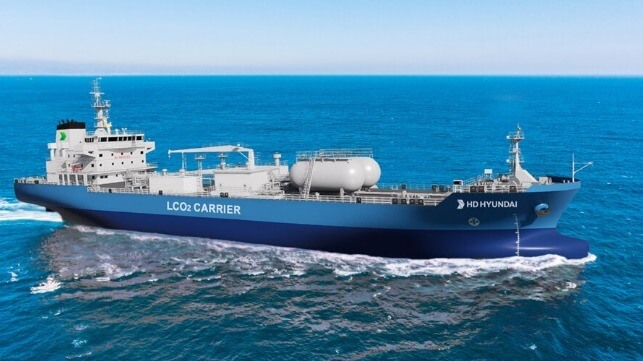Hyundai Receives Order for World’s First Large LCO2 Carriers

South Korea’s HD Hyundai through its Korea Shipbuilding & Marine Engineering believes it has cracked the market for large, general-purpose liquified CO2 carriers. The company reported today that it has received the first order for the largest LCO2 carriers ordered to date. The company which has been working to develop the technology predicts it is the beginning of continuing orders for large and extra-large vessels in this new category.
Hyundai showed off its designs for the sector last year. The company received some of the first Approval in Principle from classification societies as it sought to develop the new market and create its leadership. It looks to build on its experience in other forms of gas carriers.
Greece’s Capital Maritime Group is the first large shipowner to move forward with LCO2 carriers. The company is saying by becoming a first mover it hopes to lead the market for carbon dioxide carriers. Currently, they report a fleet of 33 crude oil and chemical tankers with a total of 5.1 million dwt.
The order is for two 22,000 cbm gas carriers valued at $141 million according to a stock exchange filing. The vessels will each be approximately 525 feet in length. Hyundai is highlighting that while they are specifically designed for the emerging LCO2 market, the vessels will also be capable of transporting various liquified cargoes. This will include liquefied petroleum gas (LPG) and ammonia (NH3) to give the vessels additional versatility.
The ships will be built at the company’s Hyundai Mipo shipyard in Ulsan, South Korea. The first delivery is set for the second half of 2025.
Analysts have forecast that this will be a rapidly emerging sector of the shipping industry tied to the efforts to capture and store carbon emissions. Estimates have said the market could reach 7.6 billion tons annually by 2050.
Currently, the only other LCO2 carriers under construction are two specialized vessels being built as part of the Northern Lights project. Fabrication began late in 2022 with the first keel laid in April 2023 at the Dalian Shipbuilding Industry Co. (DSIC) yard in Dalian, China. The ships will have a cargo capacity of 7,500 cbm, a length of approximately 427 feet, and will be operated by “K” LINE on behalf of Northern Lights. The ships are specifically designed to transport liquefied CO2 in purpose-built cargo tanks from industrial emitters in Norway and Europe to the onshore receiving facilities in Øygarden, Norway.

that matters most
Get the latest maritime news delivered to your inbox daily.
Japan is also working on a demonstration project building a small LCO2 carrier. Work has begun at the Mitsubishi Heavy Industries yard. The vessel has a capacity of 1,450 cbm of LCO2 and will be used as a demonstration ship to develop experience in the sector.
Shipbuilders especially in South Korea and Japan have been working to design future ships for this category. This comes as the first licenses have also been awarded for the storage operations that seek to inject CO2 below the seabed or into depleted offshore oil wells. Denmark became the first country to successfully demonstrate the injection and storage system as it moves to launch the first commercial operation in the North Sea. Northern Lights in Norway is scheduled to start its commercial operations in 2024.
